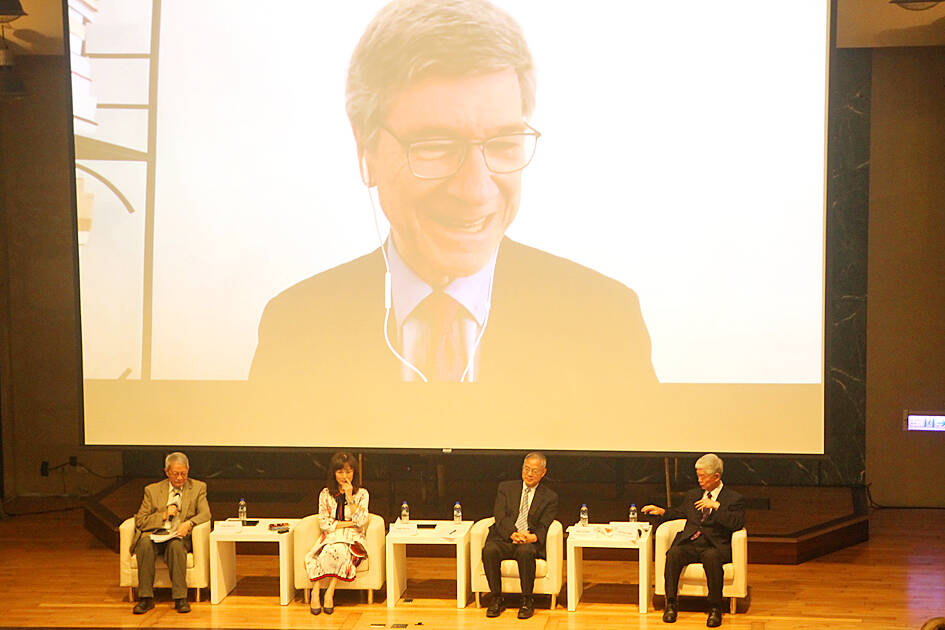Economist Jeffrey Sachs on Monday urged Taiwan and China to commit to dialogue to find a peaceful resolution amid rising cross-strait tensions.
“We need dialogue urgently, because if it’s only taking the worst of the other side and that is what’s happening right now, we will get into an escalation cycle ... we are in an escalation cycle that’s very dangerous,” Sachs said via videoconference.
He was speaking at a Tang Prize Forum at National Cheng Kung University in Tainan. Sachs has won this year’s Tang Prize for Sustainable Development.

Photo: CNA
Taiwanese academics asked Sachs about the relationship between Taiwan, China and the US, particularly following US House of Representatives Speaker Nancy Pelosi’s visit to Taipei last month. Beijing launched live-fire drills in the waters around Taiwan immediately after Pelosi’s departure.
Sachs said he believes dialogue is the best option, as it would allow all parties to understand each other’s respective position, interests and security needs.
“I hope I’m not naive in believing that there is an absolutely peaceful and mutually constructive approach, that is my strong view. And it’s not only my hope, it’s also my understanding, but we’re not naturally gravitating towards that right now because there is very little trust and very little discussion,” he said.
It is important for all sides to aim at cooperation instead of taking provocative or dangerous actions, because the economic cost of the loss of trust are extremely high, Sachs said, citing the benefits of having an integrated power grid in Northeast Asia.
“There’s no reason that Taiwan cannot power itself with Gobi Desert renewable energy, because there could be a regional grid,” he said. “But this requires trust, this requires a sense of security and national security, and that trust doesn’t exist right now.”
Referring to the distance of about 250km from Xiamen, China, to Taichung, he said: “That’s a pretty routine submarine cable, so one could, if there were a high level of trust, connect the mainland and Taiwan power grid, and make all sorts of solutions that don’t exist right now.”
Sachs is recognized for his bold and effective strategies to address complex challenges, such as extreme poverty, climate change, international debt and financial crises, national economic reforms, and the control of pandemics and epidemics.
To address issues related to sustainable development, Sachs combined the fields of economics, public health, equity and sustainability to pioneer a multidisciplinary approach, transforming sustainable development into an integrated field of study and practice, the Tang Prize Foundation has said.

Chinese Nationalist Party (KMT) Chairman Eric Chu (朱立倫), spokeswoman Yang Chih-yu (楊智伃) and Legislator Hsieh Lung-chieh (謝龍介) would be summoned by police for questioning for leading an illegal assembly on Thursday evening last week, Minister of the Interior Liu Shyh-fang (劉世芳) said today. The three KMT officials led an assembly outside the Taipei City Prosecutors’ Office, a restricted area where public assembly is not allowed, protesting the questioning of several KMT staff and searches of KMT headquarters and offices in a recall petition forgery case. Chu, Yang and Hsieh are all suspected of contravening the Assembly and Parade Act (集會遊行法) by holding

PRAISE: Japanese visitor Takashi Kubota said the Taiwanese temple architecture images showcased in the AI Art Gallery were the most impressive displays he saw Taiwan does not have an official pavilion at the World Expo in Osaka, Japan, because of its diplomatic predicament, but the government-backed Tech World pavilion is drawing interest with its unique recreations of works by Taiwanese artists. The pavilion features an artificial intelligence (AI)-based art gallery showcasing works of famous Taiwanese artists from the Japanese colonial period using innovative technologies. Among its main simulated displays are Eastern gouache paintings by Chen Chin (陳進), Lin Yu-shan (林玉山) and Kuo Hsueh-hu (郭雪湖), who were the three young Taiwanese painters selected for the East Asian Painting exhibition in 1927. Gouache is a water-based

Taiwan would welcome the return of Honduras as a diplomatic ally if its next president decides to make such a move, Minister of Foreign Affairs Lin Chia-lung (林佳龍) said yesterday. “Of course, we would welcome Honduras if they want to restore diplomatic ties with Taiwan after their elections,” Lin said at a meeting of the legislature’s Foreign Affairs and National Defense Committee, when asked to comment on statements made by two of the three Honduran presidential candidates during the presidential campaign in the Central American country. Taiwan is paying close attention to the region as a whole in the wake of a

OFF-TARGET: More than 30,000 participants were expected to take part in the Games next month, but only 6,550 foreign and 19,400 Taiwanese athletes have registered Taipei city councilors yesterday blasted the organizers of next month’s World Masters Games over sudden timetable and venue changes, which they said have caused thousands of participants to back out of the international sporting event, among other organizational issues. They also cited visa delays and political interference by China as reasons many foreign athletes are requesting refunds for the event, to be held from May 17 to 30. Jointly organized by the Taipei and New Taipei City governments, the games have been rocked by numerous controversies since preparations began in 2020. Taipei City Councilor Lin Yen-feng (林延鳳) said yesterday that new measures by